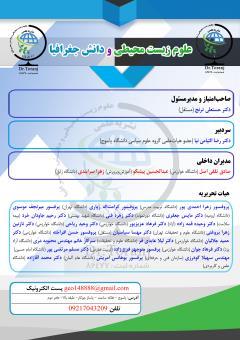«ارزیابی سیاست¬های مدیریت یکپارچه شهری در ایران با رویکرد حکمروایی»
محورهای موضوعی : علوم جغرافیا (کلیه گرایشها)محمد رامیان 1 , آزاده اربابی سبزواری 2
1 - دانشگاه آزاد اسلامی واحد اسلامشهر
2 - دانشگاه آزاد اسلامی واحد اسلامشهر
کلید واژه: حکمروایی, مدیریت شهری, حکمرانی, مدیریت یکپارچه شهری,
چکیده مقاله :
در دهه های اخیر مسائل و مشکلات شهرها پیچیده تر شده است و مدیریت یکپارچه شهری به تحول و نگرشی فراتر از نگرش و عملکرد سیستم مدیریتی سنتی پیشین نیاز دارد. تعدد مديريت و ناهماهنگی سازمان ها و نهادهای دولتی و خصوصی متولی امور شهری از مسائل اساسی در حوزه مديريت شهری، است؛ امروزه اداره مطلوب شهرها، بدون مديريت يکپارچه شهری امکان پذير نيست. تحقق مدیریت و تغییرات در رویکردهای مدیریتی در بستری اتفاق می افتد که به بستر حکمرانی شناخته می شود. مفهوم حکمرانی( Governance ) هم خانواده با با مفهوم حکومت ( Government )، اما متفاوت از آن است. حکمرانی به جای تمرکز بر دولت، قدرت را در داخل و خارج از اقتدار رسمی و نهادهای حکومت و در قالب سه رکن: «حکومت » ،« بخش خصوصی » و «جامعه مدنی » جریان می دهد. به علاوه شالودۀ حکمرانی، فرآیند تصمیم سازی و اجرای تصمیمات است که مشخص می کند چگونه سه بازیگر یادشده با اولویت ها و سلایق متفاوت، به هماهنگی می رسند. به این ترتیب موضوعات مطرح در مقوله حکمرانی، شامل قدرت و نظام توزیع آن، چگونگی سیاست گذاری، اولویت بندی ها و پاسخ گویی می شود. در این مطالعه، به ابعاد مختلف حکمروایی و مدیریت یکپارچه، پرداخته شده و موانع و چالش های حکمروایی در ایران مورد بررسی قرار گرفته است. نتایج نشان می دهد که مولفه هایی از قبیل « فقدان شهر و نظریه ای پایه برای تعریف شهر در ایران »، « عدم شکل گیری جامعه مدنی قدرتمند و تاثیرگذار»، « عدم تکوین مفهوم برنامه ریزی در ایران»، « فقدان جایگاه مفهوم شهروندی»، « جایگاه مدیریت شهری در قوانین و اسناد فرادست»، « عدم وجود یکپارچگی در مدیریت شهری» و « تامین مالی ناپایدار شهرداری ها و مشکلات تبعی آن» از مهم ترین موانع در این زمینه به شمار می روند (آشناور و همکاران،1400).
In recent decades, the issues and problems of cities have become more complex, and integrated urban management needs a transformation and an attitude beyond the attitude and performance of the previous traditional management system. The multiplicity of management and inconsistency of public and private organizations and institutions in charge of urban affairs is one of the basic issues in the field of urban management; Nowadays, the proper administration of cities is not possible without integrated urban management. Realization of management and changes in management approaches happen in a platform known as governance platform. The concept of governance is related to the concept of government, but it is different from it. Instead of focusing on the government, governance flows power inside and outside the official authority and government institutions in the form of three pillars: "Government", "Private Sector" and "Civil Society". In addition, the foundation of governance is the process of decision-making and implementation of decisions, which determines how the three mentioned actors with different priorities and tastes reach harmony. In this way, the topics raised in the category of governance include power and its distribution system, how to make policies, priorities and accountability. In this study, various aspects of governance and integrated management have been addressed and obstacles and challenges of governance in Iran have been investigated. The results show that components such as "the lack of a city and a basic theory to define the city in Iran", "the lack of formation of a powerful and influential civil society", "the lack of development of the concept of planning in Iran", "the lack of the place of the concept of citizenship" ", "the place of urban management in the laws and documents of Faradast", "lack of integration in urban management" and "unstable financing of municipalities and its related problems" are among the most important obstacles in this field (Ashnavar and colleagues, 1400).
